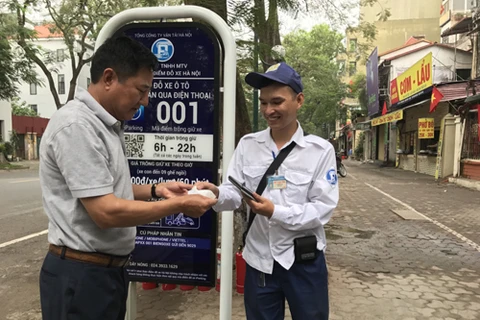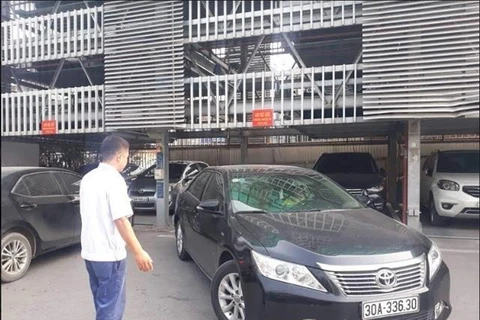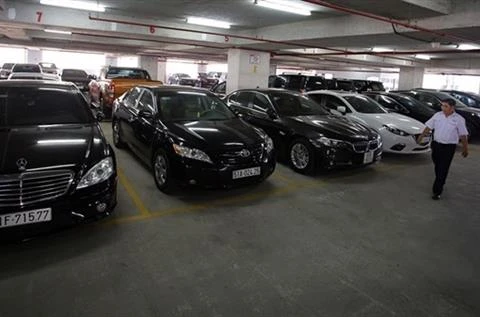Hanoi (VNS/VNA) - A service launched two years to help drivers find parking lots via an app had fallen short of expectations in Hanoi, reported Kinh Te & Do Thi (Economy & City) newspaper.
In May 2017, the municipal authority gave permission to the MTV Car Parking Company and the CIS Investment Stock Company to carry out a pilot programme using the iParking app in the city.
Under the programme, the CIS was to provide software solutions while MTV was charged with operations.
So far, 13 businesses have adopted the app, with 174 parking areas in the inner city’s districts of Hoan Kiem, Ba Dinh, Dong Da, Hai Ba Trung, Thanh Xuan, Cau Giay, Nam Tu Liem and Tay Ho.
However, the service has not met expectations.
The newspaper reported that at many iParking lots, attendants were still issuing tickets to drivers and accepting cash in the old way.
Duong Trung Kien, a resident of Cau Giay district, told that paper that he did not want to link his bank account with iParking because he was afraid of the risks.
Despite installing the app on his mobile phone, Kien still pays in cash for parking. And Kien is not the only one.
Pham Van Duc, MTV’s vice director, said: “It's simply because people are in the habit of using cash.”
“Besides, payment via text message is not available anymore, so we have to be flexible about collecting parking fees,” said Duc.
“We have to accept cash at iParking areas,” he said.
For Nguyen Phuong Hien, who works at an office on Tran Hung Dao Street, the case is different.
“I used to have the app on my mobile phone. In the very early days, I used the app to look for available parking lots and paid via the app,” Hien said.
“The service was really useful,” Hien said.
“But a few months later, I found some problems with the service.”
“On the app I could see many spaces available but when I got there, the attendants said they were already full,” Hien said.
After encountering this problem on several occasions, Hien stopped using the app.
Legal and technology hurdles
Ngo Manh Tuan, Vice Director of Hanoi's Transport Department, admitted that the application the iParking service had faced many difficulties, especially payment agreements among attendants and telecom service providers.
“Drivers can't pay for the iParking service via their telecom providers anymore,” said Tuan.
“We will switch the payment method to bank accounts and e-wallets,” he said.
CIS also needed to review and upgrade the app to ensure the connection, he said.
Agreeing with Tuan, Duc said payment methods should facilitate customers to help the service run smoothly.
It was necessary to set regulations for all businesses engaged in the service as well as sanctions for violations by businesses and customers, said Duc.
One of the regulations mentioned was to install surveillance cameras to monitor parking lots.
The city has recently asked MTV and CIS to continue expanding the service in Hanoi.
According to transport experts, Hanoi had 700,000 cars and that figure was increasing 10 percent every year, while the total parking spaces available on the iParking app was 7,000 lots, equal to 1 percent.
So, the development potential for the service is huge.
“The iParking app provides convenience for people and financial transparency for management authorities,” said Nguyen Manh Thang, a transport expert.
“The technical barriers are only a temporary problem. The model should be expanded across the city,” Thang said.
Transport expert Pham Van Thai said the iParking service was an essential component for smart transport in an urban city.
In order to operate the service smoothly, the city needed to build a digital database as soon as possible and accelerate technological application for public services, Thai said./.
In May 2017, the municipal authority gave permission to the MTV Car Parking Company and the CIS Investment Stock Company to carry out a pilot programme using the iParking app in the city.
Under the programme, the CIS was to provide software solutions while MTV was charged with operations.
So far, 13 businesses have adopted the app, with 174 parking areas in the inner city’s districts of Hoan Kiem, Ba Dinh, Dong Da, Hai Ba Trung, Thanh Xuan, Cau Giay, Nam Tu Liem and Tay Ho.
However, the service has not met expectations.
The newspaper reported that at many iParking lots, attendants were still issuing tickets to drivers and accepting cash in the old way.
Duong Trung Kien, a resident of Cau Giay district, told that paper that he did not want to link his bank account with iParking because he was afraid of the risks.
Despite installing the app on his mobile phone, Kien still pays in cash for parking. And Kien is not the only one.
Pham Van Duc, MTV’s vice director, said: “It's simply because people are in the habit of using cash.”
“Besides, payment via text message is not available anymore, so we have to be flexible about collecting parking fees,” said Duc.
“We have to accept cash at iParking areas,” he said.
For Nguyen Phuong Hien, who works at an office on Tran Hung Dao Street, the case is different.
“I used to have the app on my mobile phone. In the very early days, I used the app to look for available parking lots and paid via the app,” Hien said.
“The service was really useful,” Hien said.
“But a few months later, I found some problems with the service.”
“On the app I could see many spaces available but when I got there, the attendants said they were already full,” Hien said.
After encountering this problem on several occasions, Hien stopped using the app.
Legal and technology hurdles
Ngo Manh Tuan, Vice Director of Hanoi's Transport Department, admitted that the application the iParking service had faced many difficulties, especially payment agreements among attendants and telecom service providers.
“Drivers can't pay for the iParking service via their telecom providers anymore,” said Tuan.
“We will switch the payment method to bank accounts and e-wallets,” he said.
CIS also needed to review and upgrade the app to ensure the connection, he said.
Agreeing with Tuan, Duc said payment methods should facilitate customers to help the service run smoothly.
It was necessary to set regulations for all businesses engaged in the service as well as sanctions for violations by businesses and customers, said Duc.
One of the regulations mentioned was to install surveillance cameras to monitor parking lots.
The city has recently asked MTV and CIS to continue expanding the service in Hanoi.
According to transport experts, Hanoi had 700,000 cars and that figure was increasing 10 percent every year, while the total parking spaces available on the iParking app was 7,000 lots, equal to 1 percent.
So, the development potential for the service is huge.
“The iParking app provides convenience for people and financial transparency for management authorities,” said Nguyen Manh Thang, a transport expert.
“The technical barriers are only a temporary problem. The model should be expanded across the city,” Thang said.
Transport expert Pham Van Thai said the iParking service was an essential component for smart transport in an urban city.
In order to operate the service smoothly, the city needed to build a digital database as soon as possible and accelerate technological application for public services, Thai said./.
VNA

























